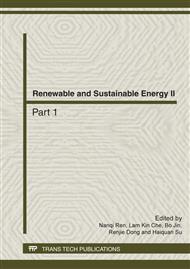[1]
C. Tso, S.Y. Chang, "A viable niche market e fuel cell scooters in Taiwan," Int. J. Hydrogen Energy, Vol. 28, No. 7, pp.757-762, 2003.
DOI: 10.1016/s0360-3199(02)00245-8
Google Scholar
[2]
W.G. Colella, "Market prospects, design features and performance of a fuel cell-powered scooter," J. Power Sources, Vol. 86, No. 1-2, pp.255-260, 2000.
DOI: 10.1016/s0378-7753(99)00486-3
Google Scholar
[3]
Electric motorcycle development action plan, Environmental Protection Administration (EPA), Executive Yuan, R.O.C., March 1998.
Google Scholar
[4]
Policy guidelines for reducing vehicle emissions in Asia, cleaner two and three wheelers, Asian Development Bank, 2003.
Google Scholar
[5]
B.D. McNicol, D.A.J. Rand, K.R. Williams, "Fuel cells for road transportation purposes–yes or no?," J. Power Sources, Vol. 100, pp.47-59, 2001.
DOI: 10.1016/s0378-7753(01)00882-5
Google Scholar
[6]
L. Schlecht, "Competition and alliances in fuel cell power train development," Int. J. Hydrogen Energy, Vol. 28, No. 7, pp.717-723, 2003.
DOI: 10.1016/s0360-3199(02)00243-4
Google Scholar
[7]
S.P. Richard, M. Whale, N. Djilali, "A techno-economic analysis of decentralized electrolytic hydrogen production for fuel cell vehicles," Int. J. Hydrogen Energy, Vol. 30, No. 11, pp.1159-1179, 2005.
DOI: 10.1016/j.ijhydene.2005.04.055
Google Scholar
[8]
M. Granovskii, I. Dincer, M.A. Rosen, "Economic and environmental comparison of conventional, hybrid, electric and hydrogen fuel cell vehicles," J. Power Sources, Vol. 159, No 2, pp.1186-1193, 2006.
DOI: 10.1016/j.jpowsour.2005.11.086
Google Scholar
[9]
J.J. Hwang, D.Y. Wang, N.C. Shih, D.Y. Lai, C.K. Chen, "Development of fuel-cell-powered electric bicycle," J. Power Sources, Vol. 133, pp.223-228, 2004.
DOI: 10.1016/j.jpowsour.2004.02.004
Google Scholar
[10]
J.J. Hwang, D.Y. Wang, N.C. Shih, "Development of a lightweight fuel cell vehicle," J. Power Sources, Vol. 141, pp.108-115, 2005.
DOI: 10.1016/j.jpowsour.2004.08.056
Google Scholar
[11]
A. Sripakagorn, N. Limwuthigraijirat, "Experimental assessment of fuel cell/supercapacitor hybrid system for scooters," Int. J. Hydrogen Energy, Vol. 34, pp.6036-6044, 2009.
DOI: 10.1016/j.ijhydene.2009.04.059
Google Scholar
[12]
H.S. Lee, K.S. Jeong, B.S. Oh, "An experimental study of controlling strategies and drive forces for hydrogen fuel cell hybrid vehicles," Int. J. Hydrogen Energy, Vol. 28, pp.215-222, 2003.
DOI: 10.1016/s0360-3199(02)00038-1
Google Scholar
[13]
P. Pei, M. Ouyang, Q. Lu, H. Huang, X. Li, "Testing of an automotive fuel cell system," Int. J. Hydrogen Energy, Vol. 29, pp.1001-1007, 2004.
Google Scholar
[14]
P. Corbo, F.E. Corcione, F. Migliardini, O. Veneri, "Experimental assessment of energy-management strategies in fuel-cell propulsion systems," J. Power Sources, Vol. 157, pp.799-808, 2006.
DOI: 10.1016/j.jpowsour.2006.01.004
Google Scholar


